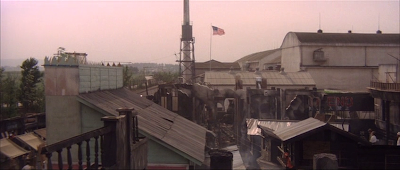 |
| Gate of Flesh (1964) / Seijun Suzuki |
 |
| Contras' City (1969) / Djibril Diop Mambéty |
These two very similar images belong to films that both deal with colonization – the first thinks of it in an entirely metaphysical manner; the second, in an entirely material. In Gate of Flesh (1964), Seizun Suzuki mourns the complete overwhelming of the Nippon spirit (which in his film is the spirit of the warrior) by post-War American presence; in Contras’ City (1969), Djibril Diop Mambéty mocks the coloniser’s complete failure to exist in harmony with the land he colonises. While Suzuki documents this utter ruin of the human soul through a group of characters committed to hedonism as an ideal, Mambéty has his fun at the expense of the baroque French architecture whose presence is an anomaly in the city-scape of Dakar (in a close-up of a French building, a voiceover remarks: ‘It looks like a pastry’). Both images feature symbols that do not fit with their general surroundings (a US flag and a French building, surrounded by refugee ghetto and a slum, respectively), but still insist on being there by existing at a greater elevation than whatever structure surrounds them – the background of the image colonises its fore through altitude-based hierarchy. Eventually, however, Mambéty’s statement from an interview holds true: ‘If you make an anti-colonialist joke, you are also making fun of the colonized themselves.’

No comments:
Post a Comment